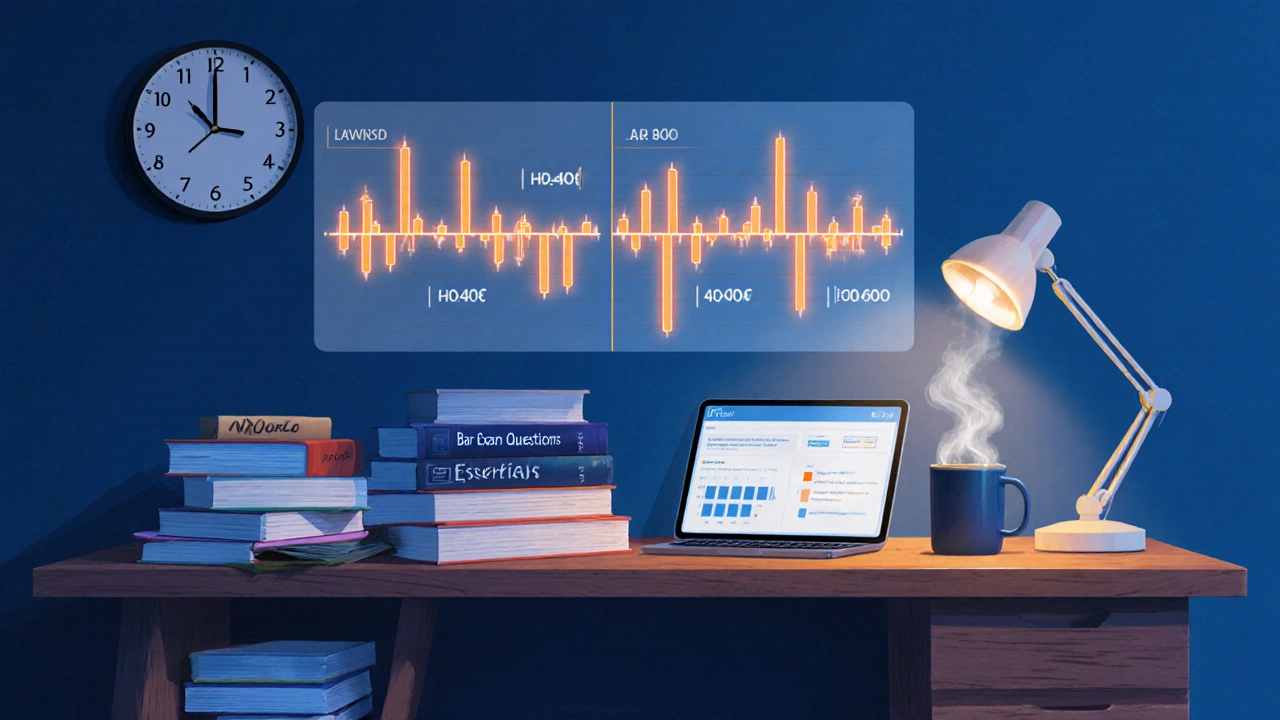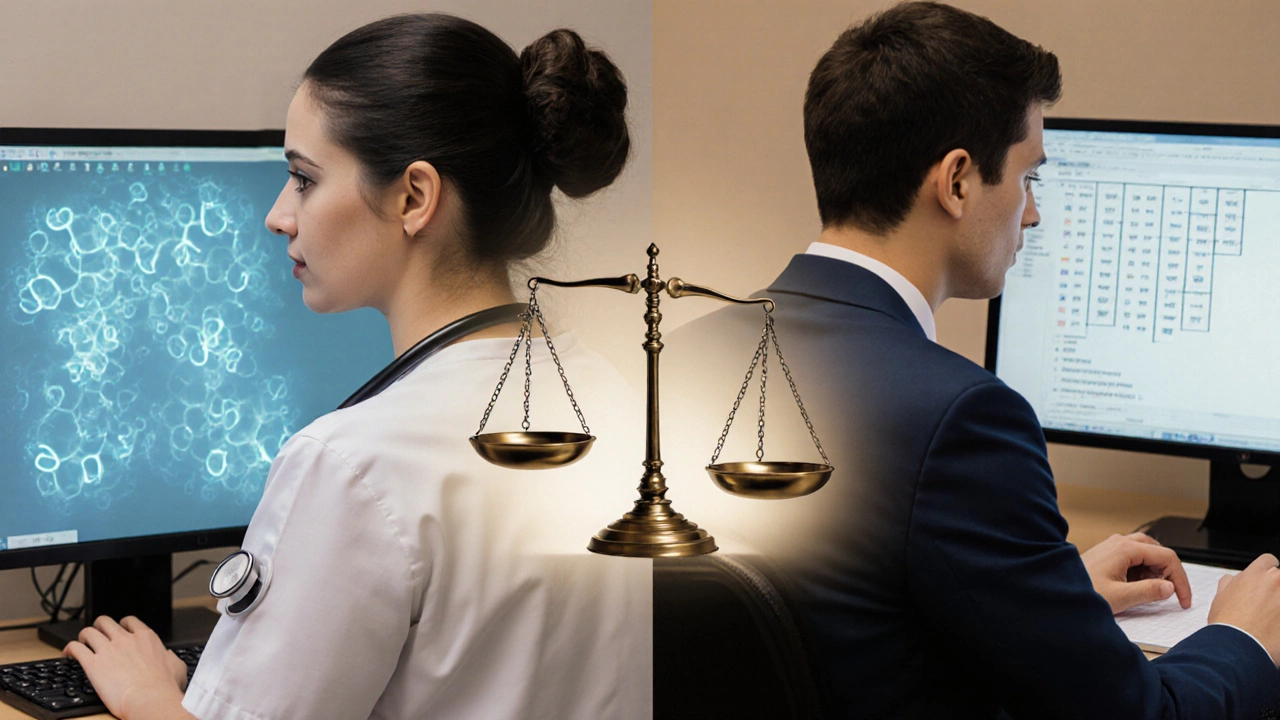NCLEX vs Bar Exam Strengths Quiz
Take this 4-question quiz to discover which exam might suit you better
Your result will appear here after answering all questions.
When you hear the words “NCLEX” and “Bar Exam,” you probably picture two completely different career paths - nursing and law. But both exams are gatekeepers that decide whether you can practice your chosen profession. So, is the NCLEX harder than the Bar Exam? The answer isn’t a simple yes or no; it depends on what you measure - content breadth, test format, pass rates, or the amount of study time you need. This article breaks down the two tests side by side, gives you the hard numbers, and helps you figure out which challenge matches your strengths.
Key Takeaways
- The NCLEX focuses on clinical judgment and safety; the Bar Exam tests legal analysis and essay writing.
- Pass rates are similar (around 85% for NCLEX, 70‑80% for most state bar exams), but the Bar Exam has a higher failure risk for first‑time takers.
- Study time averages 300‑400 hours for NCLEX and 400‑600 hours for the Bar Exam.
- Both exams use computer‑based testing, but the Bar Exam mixes multiple‑choice with performance‑type questions.
- Choosing the “harder” exam really comes down to your personal strengths - clinical reasoning vs. legal reasoning.
What the NCLEX Is and What It Tests
NCLEX is a national licensing exam for registered nurses (RNs) and practical nurses (LPNs) that evaluates a candidate’s ability to provide safe and effective care. Developed by the National Council of State Boards of Nursing, the exam is administered by Pearson VUE in a computer‑adaptive format. That means the difficulty of each question adjusts based on how you answered the previous one, so you never see the same question twice.
The NCLEX covers four major client needs: safe & effective care environment, health promotion & maintenance, psychosocial integrity, and physiological integrity. Within those categories, you’ll answer questions about pharmacology, patient assessment, care planning, and emergency response. The test does not ask you to memorize a law code; it wants you to think like a bedside nurse, prioritizing tasks under pressure.
What the Bar Exam Is and What It Tests
Bar Exam is a state‑administered licensing exam for prospective attorneys that measures knowledge of substantive law, ethical rules, and practical legal skills. Each state’s bar association designs its own version, but most follow the Uniform Bar Examination (UBE) model, which consists of three sections: the Multistate Bar Examination (MBE) - 200 multiple‑choice questions, the Multistate Essay Examination (MEE) - six essay questions, and the Multistate Performance Test (MPT) - two simulated tasks like drafting a memorandum.
The Bar Exam tests analytical reasoning, legal writing, and the ability to apply statutes and case law to fact patterns. Unlike the NCLEX’s adaptive engine, the Bar Exam delivers a static set of questions, and you must manage time across different question types.

Pass Rates: How Often Do Candidates Succeed?
Both exams have respectable pass rates, but the trends differ by jurisdiction and candidate background.
- NCLEX: National pass rate for first‑time RN candidates hovers around 85% according to the National Council of State Boards of Nursing (2024 data). Repeat takers see a slight dip, landing near 65%.
- Bar Exam: The UBE national pass rate for first‑time takers averages 73% (2023‑2024 cycle). Some states, like California, sit lower (~60%), while others, like Wisconsin, exceed 80%.
These numbers show that while both exams are challenging, the Bar Exam carries a higher risk of failure for those who haven’t prepared intensively.
Study Hours and Typical Preparation Routes
How much time you need to feel ready depends on your prior knowledge and learning style.
- Study Hours for NCLEX are typically 300‑400 hours, spread over 2‑4 months of focused review. Many candidates use commercial NCLEX prep courses that combine content review, practice questions, and simulated adaptive tests.
- Study Hours for Bar Exam range from 400‑600 hours, often organized into a 10‑week intensive boot camp or a self‑paced 6‑month program. The mix of multiple‑choice, essay, and performance tasks means you need to practice writing under timed conditions.
Both exams benefit from repeated practice tests. For NCLEX, the adaptive nature makes it crucial to answer hundreds of practice questions to get comfortable with the algorithm. For the Bar Exam, taking full‑length simulated exams helps you build stamina for the six‑hour testing day.
Test Format: What the Day Looks Like
Understanding the day‑of logistics can calm nerves.
| Aspect | NCLEX | Bar Exam (UBE) |
|---|---|---|
| Administration | Computer‑adaptive, single session (6‑8 hours) | Three sections over two days (MBE 6h, MEE+MPT 3h) |
| Question Types | Multiple‑choice, multiple response, fill‑in‑the‑blank, ordered response, graphic based | 200 multiple‑choice (MBE), 6 essay (MEE), 2 performance tasks (MPT) |
| Scoring | Pass/fail; adaptive algorithm determines difficulty threshold | Scaled scores; 266‑277 (depending on jurisdiction) to pass |
| Retake Policy | Every 45days, unlimited attempts | Usually twice per year, state‑specific limits |
The NCLEX’s adaptive design means you never know exactly how many questions you’ll face - it stops when the algorithm is confident about your competency. The Bar Exam’s static layout lets you plan pacing, but the essay and performance sections add a writing component that many test‑takers find stressful.
Credentialing Bodies: Who Sets the Rules?
Both exams are overseen by powerful state‑level organizations.
- State Board of Nursing (or equivalent) is the regulatory authority that adopts the NCLEX as the licensing requirement for nurses in each state. They also define the number of clinical hours needed before eligibility.
- State Bar Association governs the administration of the Bar Exam, sets ethical standards, and issues the license to practice law upon successful completion. Each association may add a local component, like a state‑specific multiple‑choice section.
Both bodies publish detailed candidate handbooks that outline eligibility, testing windows, and score reporting timelines. Ignoring these guides is a common mistake that leads to last‑minute surprises.

Preparation Resources: What Works Best?
Investing in high‑quality prep material can shave dozens of study hours off your timeline.
- NCLEX: Companies like Kaplan, UWorld, and Hurst Review offer video lectures, question banks, and full‑length adaptive simulations. Many nurses also join study groups on platforms like Reddit’s r/NCLEX.
- Bar Exam: Bar prep giants such as BarBri, Themis, and Kaplan provide comprehensive outlines, multiple‑choice question banks, and essay feedback services. Some candidates supplement with commercial case‑books to hone analytical skills.
Whichever path you choose, practice under timed conditions and review rationales for every answer - that’s the only way to internalize the reasoning patterns the exam expects.
Which Exam Feels Harder? A Decision Framework
Below is a quick decision tree you can run through yourself:
- Do you thrive on memorizing facts (drug names, legal statutes) or applying concepts to real‑world scenarios?
If you prefer the latter, NCLEX’s clinical judgment may feel more natural. - Are you comfortable writing essays under pressure?
If not, the Bar Exam’s essay and performance sections could be the tougher part. - How do you handle adaptive testing?
If the idea of a test that changes difficulty scares you, the static Bar Exam might be less stressful. - What’s your current professional background?
Nurses already have clinical exposure; law students have legal research training. Aligning with your existing skill set reduces perceived difficulty.
In short, the "harder" label is subjective. Statistically, the Bar Exam has a slightly lower overall pass rate, but the NCLEX’s adaptive algorithm can feel unforgiving if you’re not accustomed to rapid decision‑making.
Final Thoughts: Preparing for Success
Whether you’re staring at a nursing cap or a lawyer’s robe, the key to conquering either exam is strategic preparation:
- Start early - give yourself at least 3‑4 months of dedicated study time.
- Use official practice materials: the NCSBN’s NCLEX‑RPractice Exam and the National Conference of Bar Examiners’ sample MBE questions.
- Track your performance metrics - aim for 80%+ on practice tests before scheduling the real thing.
- Build a support system. Study groups, mentors, and mental‑health breaks improve retention and reduce burnout.
When the day arrives, remember that both exams are designed to protect the public - the NCLEX safeguards patients, the Bar Exam safeguards clients. Treat the challenge as a professional rite of passage, and you’ll emerge more confident regardless of which test you faced.
Frequently Asked Questions
How many questions are on the NCLEX?
The NCLEX is computer‑adaptive and can range from 75 to 265 questions. The exam ends when the algorithm determines your competence level.
What score do I need to pass the Bar Exam?
Each state sets its own passing score, usually between 266 and 277 on the scaled 400‑point MBE. You must also achieve a minimum on the essay and performance sections.
Can I take the NCLEX and Bar Exam in the same year?
Yes, there’s no rule preventing you from sitting both exams in one calendar year, but you’ll need a rigorous study schedule to avoid burnout.
Which exam has more stressful test‑day conditions?
Stress varies by individual. The NCLEX’s adaptive pacing can feel unpredictable, while the Bar Exam’s long, multi‑section day can be exhausting. Choose the format that matches your endurance style.
Do I need a formal prep course for either exam?
Formal courses aren’t mandatory, but they provide structure, expert explanations, and large question banks that many candidates find essential for reaching a pass‑ready level.




